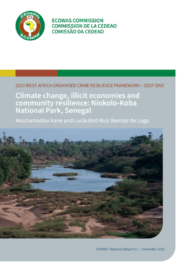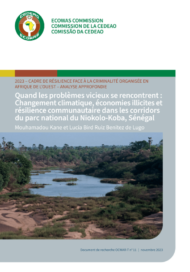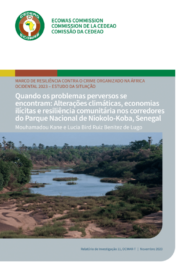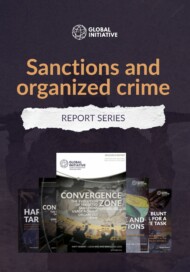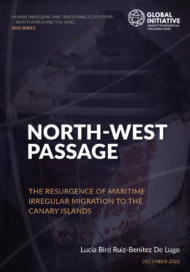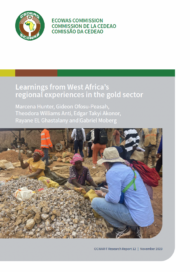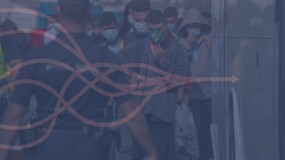Posted on 23 Jan 2024
The 2023 West Africa Organized Crime Resilience Framework (OCRF) is a tool developed by the GI-TOC as part of the Organised Crime: West African Response to Trafficking (OCWAR-T) project. The OCRF sets out the organized crime and security landscape across West Africa, identifying the key risks and vulnerabilities in West African states, as well as providing a nuanced analysis of states’ resilience. Three deep dives focus on informing and assessing existing responses and gearing these towards prevention.
- New approaches to regulating drugs in West Africa: Exploring the impact of Ghana’s drug policy reform
- Self-defence groups as a response to crime and conflict in West Africa: Learning from international experience
- Climate change, illicit economies and community resilience: Niokolo-Koba National Park, Senegal
In West Africa, communities grappling with the severe impacts of climate change are turning to organized crime for survival. This alarming trend worsens climate impacts and amplifies the damage to local communities and ecosystems. It’s clear: illicit economies and corruption are both a result and a driver of the climate crisis in this region.
This deep dive, part of the West Africa Organised Crime Resilience Framework series, provides an in-depth analysis of the critical intersection between climate change and illicit economies in West Africa, specifically focusing on the Kédougou region in Senegal. This region, like many others in West Africa, faces severe impacts from climate change, compelling communities to increasingly engage in organized crime as a coping mechanism. The report highlights how these activities, in turn, exacerbate environmental degradation, contributing further to climate change and undermining efforts towards achieving Sustainable Development Goals (SDGs).
The study emphasizes the heightened vulnerability of areas like the Niokolo-Koba National Park, a key component in the fight against climate change due to its role in lowering air temperatures, absorbing floodwaters, and functioning as a carbon sink. However, enforcing regulatory frameworks in these protected areas has led to community grievances, particularly as traditional practices become criminalized.
The report explores the rise of illicit economies, notably artisanal and small-scale gold mining (ASGM), driven by climate-induced agricultural instability. These activities pose significant environmental threats, including poaching and illicit logging. The growing concerns about non-state armed groups exploiting regional grievances for legitimacy in resource-rich areas are examined.
This comprehensive study aims to provide valuable insights into the nexus of climate change and illicit economies. It also scrutinizes available response frameworks, with an emphasis on community-based solutions. The goal is to assist regional policymakers in adopting evidence-based approaches to mitigate the complex challenges at this intersection.
Organized Crime: West African Response to Trafficking (OCWAR–T)
OCWAR–T is a project supporting the ECOWAS Commission and its member states in reducing transnational organised crime. For this purpose, OCWAR-T addresses the strengthening of institutional structures, capacities and knowledge. Specifically, it supports efforts in criminal investigation and prosecution, improving small arms control and reducing human trafficking. The project is coordinated by the Deutsche Gesellschaft für Internationale Zusammenarbeit (GIZ) and co-funded by the German Federal Foreign Office and European Union. The project component is implemented by ISS and GI-TOC in close coordination with ECOWAS, a central stakeholder across the entire OCWAR-T structure.
